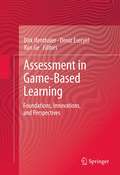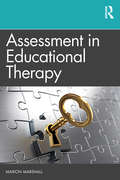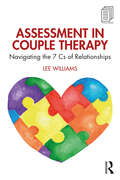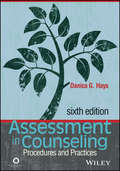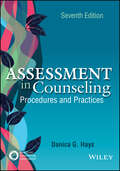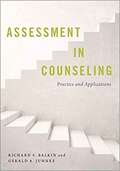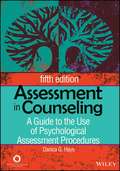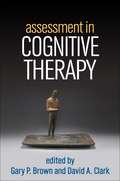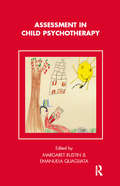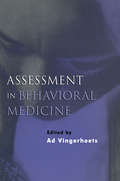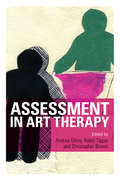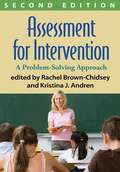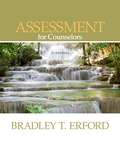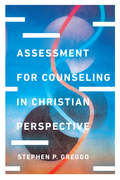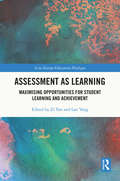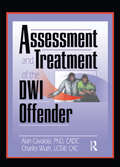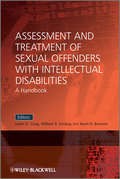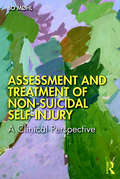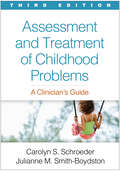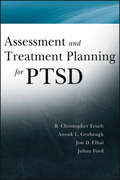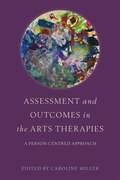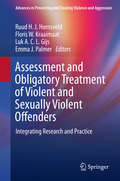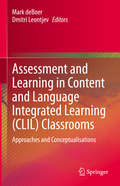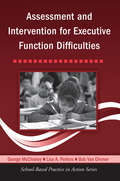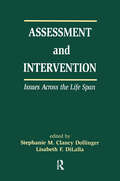- Table View
- List View
Assessment in Game-Based Learning: Foundations, Innovations, and Perspectives (Advances In Game-based Learning Ser.)
by Dirk Ifenthaler Xun Ge Deniz EseryelThe capabilities and possibilities of emerging game-based learning technologies bring about a new perspective of learning and instruction. This, in turn, necessitates alternative ways to assess the kinds of learning that is taking place in the virtual worlds or informal settings. accordingly, aligning learning and assessment is the core for creating a favorable and effective learning environment. The edited volume will cover the current state of research, methodology, assessment, and technology of game-based learning. There will be contributions from international distinguished researchers which will present innovative work in the areas of educational psychology, educational diagnostics, educational technology, and learning sciences. The edited volume will be divided into four major parts.
Assessment in Educational Therapy
by Marion E. MarshallAssessment in Educational Therapy offers essential grounding, skills, and ethical approaches for understanding and conducting assessments in the context of educational therapy. Six clear, straightforward chapters guide graduate students and trainees of the field to use scores, observation, and hypothesis testing to create strengths-based assessments and intervention strategies that can be delivered orally or in written reports. The book is the first to describe and critique all the standardized assessment instruments that qualified educational therapists can use to measure skills in reading, written expression, mathematics, and processing. Real-world case studies, practical takeaways of key concepts, resources for self-study, reflective questions, and other readers’ tools enliven this comprehensive yet accessible reference.
Assessment in Couple Therapy: Navigating the 7 Cs of Relationships
by Lee WilliamsThis innovative text offers a simple but comprehensive framework for couple assessment that integrates research and information on couples from a wide range of models. Using the 7 Cs as a basis for guiding assessment, chapters move through key areas of couple functioning including communication, conflict resolution, culture, commitment, caring and sex, contract, and character. An additional chapter on children also offers insights into assessment of couples who parent. Offering a broad and accessible framework that can be applied to a variety of theoretical perspectives, the book highlights how the 7 Cs can be used to inform both assessment and treatment of couples. Numerous case examples are interwoven throughout the text to demonstrate how therapists may utilize this approach to work with a diverse client base. Written in an accessible style, Assessment in Couple Therapy is an essential tool for students of marriage and family therapy and beginning therapists, as well as seasoned mental health professionals working with couples in a range of settings.
Assessment in Counseling: Procedures and Practices
by Danica G. HaysThe latest edition of this perennial bestseller instructs and updates students and clinicians on the basic principles of psychological assessment and measurement, recent changes in assessment procedures, and the most widely used tests in counseling practice today. Dr. Danica Hays guides counselors in the appropriate selection, interpretation, and communication of assessment results. This edition covers more than 100 assessment instruments used to evaluate substance abuse and other mental health disorders, intelligence, academic aptitude and achievement, career and life planning, personal interests and values, assessment of personality, and interpersonal relationships. In addition, a new chapter on future trends in assessment discusses the changing cultural landscape, globalization, and technology. Perfect for introductory classes, this text provides students and instructors with practical tools such as bolded key terminology; chapter pretests, summaries, and review questions; self-development and reflection activities; class and field activities; diverse client case examples; practitioner perspectives illustrating assessment in action; and resources for further reading. PowerPoint slides, a test bank, a sample syllabus, and chapter outlines to facilitate teaching are available to instructors by request to ACA. *Requests for digital versions from the ACA can be found on wiley.com. *To request print copies, please visit the ACA website here. *Reproduction requests for material from books published by ACA should be directed to permissions@counseling.org
Assessment in Counseling: Procedures and Practices
by Danica G. HaysThis best-selling text explains the basic principles of psychological assessment and measurement and guides students and practitioners in the appropriate selection, interpretation, and communication of test results. Danica Hays introduces more than 150 assessment instruments used to evaluate mental health, intelligence, career development, wellness, personality, and interpersonal relationships. This latest edition covers new or expanded content on assessment use in schools, colleges/universities, and telehealth platforms; interprofessional collaboration to support assessment practices and procedures; qualitative assessment approaches and how they can be infused throughout counseling and assessment; cultural and social justice considerations and practices; and crisis and trauma assessment. Numerous in-text features facilitate teaching and learning, including chapter pretests, trainee-centered reflective and field activities, practitioner perspectives, tip sheets on major concepts and practices, sample assessment items and tools, and case examples. A supplemental Instructor’s Guide is available by request that consists of a test bank, PowerPoint slides, and a sample syllabus. READ MORE: *Requests for digital versions from ACA can be found on www.wiley.com. *To purchase print copies, please visit the ACA website here *Reproduction requests for material from books published by ACA should be directed to permissions@counseling.org
Assessment in Counseling: Practice and Applications
by Gerald A. Juhnke Richard S. BalkinStudents often experience assessment courses, and subsequently the textbooks used for the course, as a statistics-heavy class accompanied by an encyclopedia of a variety of assessments. Assessment in Counseling alternatively emphasizes the skills used in assessment, thereby enabling students to apply these skills across a broad range of assessment instruments and strategies. Assessment, like most core areas of counseling, has a theoretical basis and a pertinent, practical component. However, this practical component often gets lost in the application of the skills and use of instruments that heavily rely on psychometric properties. <p><p> Written in an accessible, conversational tone, this text focuses on the application of the theoretical and measurement concepts of assessment in counseling and introduces three case studies that are followed throughout the text. Additionally, instead of introducing readers to a plethora of instruments, the authors select seminal measures that students are likely to approach and use in the profession. Through the use of this text and course content, one will acquire the skills to search, select, and administer the type of assessment instruments that he/she deems helpful for their practice as a professional counselor, regardless of specialization. Ultimately, this textbook serves as an invaluable guide for administering, scoring, interpreting, and communicating assessment results.
Assessment in Counseling: A Guide to the Use of Psychological Assessment Procedures
by Albert Danica G. Hays B. HoodNow more user-friendly than ever, while continuing the legacy of excellence that Albert Hood and Richard Johnson began, the latest version of this best-selling text updates students and clinicians on the basic principles of psychological assessment, recent changes in assessment procedures, and the most widely used tests relevant to counseling practice today. Hays walks the reader through every stage of the assessment process and provides practical tools such as bolded key terminology; chapter pretests, summaries, and review questions; self-development and reflection activities; client case examples; practitioner perspectives illustrating assessment in action; and handy tip sheets. More than 100 assessment instruments examining intelligence, academic aptitude and achievement, career and life planning, personal interests and values, personality, and interpersonal relationships are described. Also discussed are specialized mental health assessments for substance abuse, depression, anxiety, anger, self-injury, eating disorders, suicide risk, and attention deficit hyperactivity disorder.
Assessment in Cognitive Therapy
by David A. Clark Gary P. BrownThis volume brings together leading experts to explore the state of the art of cognitive clinical assessment and identify cutting-edge approaches of interest to clinicians and researchers. The book highlights fundamental problems concerning the validity of assessments that are widely used in cognitive-behavioral therapy (CBT). Key directions for further research and development are identified. Updated cognitive assessment methods are described in detail, with particular attention to transdiagnostic treatment, evidence-based practice, cognitive case formulation, and imagery-based techniques.
Assessment in Child Psychotherapy (Tavistock Clinic Series)
by Margaret Rustin Emanuela QuagliataThis book describes an approach to children and young people who might be helped by child psychotherapy. Attention is paid to factors within the child's personality, to strengths and impediments in the developmental process, and to the family and wider school and community context. Individual chapters address both clinical methods and a variety of clinical problems, including work with very young children and their parents, severe deprivation and family breakdown, developmental delay, and the more serious psychological illnesses of childhood. Assessment in Child Psychotherapy is a significant contribution to all mental health professionals who need to be able to identify the precise nature of a child, adolescent or family's problems and to offer the most appropriate help. Such a book is long overdue. It spans a range of thinking about how best to reach those whose emotional and behavioural difficulties pose challenging questions as to the most suitable forms of treatment.
Assessment in Behavioral Medicine
by Ad VingerhoetsHow can the influence of behavioral factors on health and well-being be measured? Research over the past two decades has shown that psychological factors and lifestyle have been found to be relevant to the onset and course of disease. In addition, these factors codetermine how patients and those in their social environment cope with illness and what their quality of life is. Assessment in Behavioral Medicine gives the reader a greater understanding of the influence of behavioral factors on somatic health. There is a continuing need for research to better our understanding of the processes that play a crucial role in the influence of psychosocial factors on health. However, the proliferation of tools for assessing psychosocial and psychobiological factors makes it difficult to make an optimal choice of measurement. This volume aims to advance the state of measurement in the multidisciplinary fields of behavioral medicine and health psychology by bringing together state-of-the-art theory and research on assessment issues in this area. It provides the reader with an insight into the different kinds of measures that are available, along with practical guidelines for choosing the appropriate tools and designs to meet specific research questions. Assessment in Behavioral Medicine is a unique resource for students, researchers, clinicians and teachers who are involved in education, research or clinical work in which measuring behavioral and psychosocial factors is a crucial activity.
Assessment in Art Therapy
by Andrea Gilroy Robin Tipple Christopher BrownAssessment in Art Therapy gives a unique insight into the diverse contemporary practices that constitute assessment in art therapy, providing an overview of the different approaches employed in Britain and the USA today. This professional handbook comprises three parts. 'Sitting Beside' explores the discursive and the relational in art therapy assessments with adults and children in different settings. 'Snapshots from the Field' presents a series of short, practice-based reports which describe art therapists working in private practice, secure settings and community mental health centres. 'A More Distant Calculation' consists of chapters that describe the development and use of different kinds of art-based assessment procedures developed on both sides of the Atlantic, as well as different kinds of research about art therapy assessment. Both students and practitioners alike will benefit from the wealth of experience presented in this book, which demonstrates how art therapists think about assessment; the difficulties that arise in art therapy assessment; and the importance of developing the theory and practice of art therapy assessment, whilst taking into account the changing demands of systems and institutions.
Assessment for Intervention
by Rachel Brown-Chidsey Kristina J. AndrenThis cutting-edge volume offers a complete primer on conducting problem-solving based assessments in school or clinical settings. Presented are an effective framework and up-to-date tools for identifying and remediating the many environmental factors that may contribute to a student's academic, emotional, or behavioral difficulties, and for improving all children's educational outcomes. Concise, consistently formatted chapters from leading researchers describe problem-solving based applications of such core assessment methods as interviews, observations, rating scales, curriculum-based measurement, functional behavioral assessment, and published tests. Including helpful case examples to demonstrate each method in action, the volume also offers invaluable tips on collaborating with teachers and school administrators, writing solution-focused psychoeducational reports, and evaluating the effectiveness of interventions.
Assessment for Counselors
by Bradley T. ErfordErford's book presents a broad overview of basic issues in psychological and educational assessment. The book familiarizes students with the essentials of testing, covering such concepts as ethical, legal, and diversity issues; reliability, validity, and test construction; and the pertinent tests needed by professional counselors to conduct thorough and effective assessments. Erford's guidance on basic procedures such as test selection, as well as the book's examples and applications relevant to a range of practices and clientele, help students learn how and when to use the correct assessment tools with diverse clients. In addition, the author and other contributors focus on the importance of counselor identity and the essentials of this complex field.
Assessment for Counseling in Christian Perspective (Christian Association for Psychological Studies Books)
by Stephen P. GreggoAssessment in counseling—like its biblical counterpart, discernment—is an ongoing and dynamic routine to encourage movement in a productive direction toward what is truly best. In Assessment for Counseling in Christian Perspective, Stephen P. Greggo equips counselors to put assessment techniques into practical use, particularly with clients who are looking to grow in their identity with Jesus Christ. As a Christian perspective on assessment, this book is designed to supplement standard resources and help counselors navigate challenges at the intersection of psychotherapy and Christian ministry. Greggo charts a course for care that brings best practices of the profession together with practices of Christian discipleship. Key topics include: Does a Christian worldview offer distinguishing parameters for assessment practice? Can clinical proficiency in assessment bring glory to God? How can the crucial psychometric construct of validity be translated into our Christian faith? In what ways can the inclusion of objective procedures be transformed into a message of hospitality and affirmation? How can counselors maximize the benefits of a therapeutic alliance to attend to immediate concerns and foster spiritual formation? How can formal personality measures add depth and substance to the counseling experience? How can assessment contribute to client retention, treatment completion, and aftercare planning? With Assessment for Counseling in Christian Perspective, clinical and pastoral counselors can bring the best of assessment into counseling that reflects the essence of the Christian faith.
Assessment as Learning: Maximising Opportunities for Student Learning and Achievement (Asia-Europe Education Dialogue)
by Zi Yan Lan YangBased on a solid theoretical basis of assessment-as-learning and updated empirical evidences, this timely book significantly expands the existing scope of assessment-as-learning typically developed in Western contexts. This edited volume updates theoretical and empirical advances in assessment-as-learning in complex learning processes, brought together by an international panel of authors. The contributors provide a wide range of practical ways to harness the power of assessment-as-learning to make it work more effectively not only in the classroom, but also across other achievement-related situations (e.g. examinations, learning processes before and after classes). Assessment as Learning provides a deep contemporary insight into the field of formative assessment, and brings much-needed international perspectives to complement the current Western-focused research. This is a valuable contribution to the discussion, and provides useful insight for researchers in Education.
Assessment and Treatment of the DWI Offender
by Charles Wuth Alan A CavaiolaWork more effectively with DWI offenders!This valuable book provides current information on the psychological, social-demographic, and psychiatric characteristics of DWI offenders. It also will provide you with up-to-date assessment strategies that can be employed with offenders, who characteristically are resistant to such assessment. Until now, books written on this subject have focused purely on research that has been done with offenders. This book, however, provides both theoretical and applied strategies for working with this very difficult population in clinical/treatment settings. Assessment and Treatment of the DWI Offender provides practical treatment approaches such that will help you manage client resistance and incorporate family members and significant others into the treatment process to more effectively treat offenders.Assessment and Treatment of the DWI Offender examines: the important variables that separate DWI offenders from alcoholics in general, as well as the “normal” population patterns of drinking behavior among offenders the magnitude of the DWI problem in the United States the history of the DWI countermeasures movement prevention and public education organizations such as SADD, MADD, the Partners in Progress program, the College Binge Drinking Initiative, and more enforcement techniques like breath testing, standardized field sobriety tests, on-site drug detection devices, etc. problems with the tools and techniques that are currently being used to address this issue interviewing techniques that work with DWI offenders more!Intended primarily for counselors, social workers, psychologists, and other professionals who work with DWI offenders and packed with helpful and easy-to-read statistical charts and tables, this book is also essential for graduate students in psychology, social work, chemical dependency, or any of the helping professions.
Assessment and Treatment of Sexual Offenders with Intellectual Disabilities
by Kevin D. Browne William R. Lindsay Leam A. CraigA practical handbook for practitioners that covers the assessment, treatment and management of sexual offenders with intellectual disabilities - an area of growing interest within clinical forensic psychology. New for the Wiley Series in Forensic Clinical Psychology: a practical handbook that covers the assessment, treatment and management of sexual offenders with intellectual disabilitiesSummarises the research literature on the characteristics and prevalence of sexual offenders with intellectual disabilitiesDiscusses risk assessment and innovations in treatment and managementIncludes contributors world-renowned in the field of assessment and treatment of sexual offenders with intellectual disabilities such as Tony Ward, Glynis Murphy, and Douglas Boer
Assessment and Treatment of Non-Suicidal Self-Injury: A Clinical Perspective
by Bo MøhlAssessment and Treatment of Non-Suicidal Self-Injury: A Clinical Perspective is the ideal primer for anyone who works with people who self-injure. Profiling who is affected as well as what their behaviour includes, the book explores the range of factors behind why people self-injure, from the influence of social media to the need for self-regulation, and offers recommendations for both assessment and outpatient treatment. Throughout, the book is permeated by profound respect for those who use self-injury in an attempt to live a good life, while conveying a deep understanding of the challenges that self-injury presents for family members and treatment professionals. It recognizes that the behaviour can spread in hospital wards or other institutional setting, introducing the concept of self-injury by proxy, and assesses the range of therapies available, including CBT, MBT, ERGT and family therapy. Each chapter is complemented by clinical vignettes. In an era when a great number of professionals will come into contact with someone who self-injures – including teachers, social workers and nurses as well as therapists – The Assessment and Treatment of Non-Suicidal Self-Injury is an invaluable resource that examines both the causes and the treatments available.
Assessment and Treatment of Childhood Problems, Third Edition: A Clinician's Guide
by Carolyn S. Schroeder Julianne M. Smith-BoydstonThis highly accessible work, now thoroughly revised, has shown thousands of students and clinicians how to assess and treat children's emotional and behavioral difficulties from a developmental perspective. The authors provide a sound understanding of typical development (ages 2-12) and the risk and protective factors for psychopathology. Chapters on common psychological disorders and family stressors describe the nature of each problem, review evidence-based treatments, and offer step-by-step guidelines for intervention, illustrated with helpful case examples. A comprehensive framework for assessing children and planning treatment is used throughout. Purchasers get access to a Web page where they can download and print the book's 24 reproducible forms and handouts in a convenient 8 1/2" x 11" size. New to This Edition: *Chapters on developmental disabilities and trauma. *Significantly revised to reflect advances in assessment, treatment, and developmental psychopathology research. *Additional material on pharmacological treatments in each disorder-specific chapter. *Sibling rivalry chapter expanded to include difficulties with peers. *Updated for DSM-5.
Assessment and Treatment Planning for PTSD
by Julian D. Ford Jon D. Elhai Christopher Frueh Anouk GrubaughEvidence-based approaches to diagnosing and treating PTSD in an array of specific populations and settingsThis timely, practical guide for busy professionals:Covers strategies for those working in specialized practice settings, such as primary care facilities, prisons, and hospitals for the severely mentally illOffers guidelines for conducting forensic evaluationsProvides information on malingering assessmentExplores new frontiers in PTSD assessment, including neuroimaging and genetic testingOffers practical guidance on the assessment of most recognized comorbid conditionsDiscusses the roles of ethnicity, race, and culture in assessing and treating PTSDOffers assessment strategies for specific populations, including veterans, children, and the severely impaired
Assessment and Outcomes in the Arts Therapies: A Person-Centred Approach
by Caroline Miller Claire Molyneux Laura Fogg-Rogers Mariana Torkington Suzanne C. Purdy Robin Barnaby Abigail Raymond Margaret-Mary Mulqueen Marion Gordon-Flower Sylvia Leão Alison TalmageThere is increasing pressure on therapists to provide details of structured assessments and to report therapy outcomes to funders, employers and co-workers. This edited volume provides a series of case studies, with varied client groups, giving arts therapists an accessible introduction to assessment and outcome measures that can be easily incorporated into their regular practice. The book provides demonstrations, within a practice-based evidence framework, of how measures can be tailored to the individual client's needs. The case studies show assessment and outcome models for music therapy, art therapy and dramatherapy used with a range of client groups including people with intellectual disabilities, Autism Spectrum Disorders, Multiple Sclerosis and Parkinson's Disease and those suffering from depression, Post-Traumatic Stress Disorder or coping with bereavement.
Assessment and Obligatory Treatment of Violent and Sexually Violent Offenders: Integrating Research and Practice (Advances in Preventing and Treating Violence and Aggression)
by Emma J. Palmer Ruud H. J. Hornsveld Floris W. Kraaimaat Luk A. C. L. GijsThis book examines the assessment and obligatory treatment programs for violent and sexually violent offenders – primarily adolescents and adults – diagnosed with cluster B personality disorder or a conduct disorder. It describes concepts, theories, and legal aspects as well as the psychological and neurobiological characteristics of violent and sexually violent offenders and forensic psychiatric patients. Chapters review treatment programs and provide guidelines for gathering additional information and formulating functional analyses to establish individual treatment plans. In addition, chapters offer treatment modules for violent offenders and sexually violent offenders and address specific problems that may be encountered in practice and how to overcome these problems. The book concludes with the editors’ recommendations for future research in offender assessment and rehabilitation.Topics featured in this book include:Heuristic models of aggressive and sexually aggressive behavior.The use of self-reporting questionnaires in offender populations.Reliable assessment instruments.The effectiveness of existing rehabilitation programs. Cognitive-behavioral treatment modules for violent and sexually violent offenders.Self-regulation and self-management skills to be used in rehabilitation programs.Facilitating treatment integrity in penitentiary and forensic psychiatric institutions.Assessment and Obligatory Treatment of Violent and Sexually Violent Offenders is an essential resource for researchers, clinicians/therapists, and upper-level undergraduate and graduate students in forensic psychology, public health, criminology/criminal justice, and behavioral therapy and rehabilitation.
Assessment and Learning in Content and Language Integrated Learning (CLIL) Classrooms: Approaches and Conceptualisations
by Mark DeBoer Dmitri LeontjevThis volume builds a conceptual basis for assessment promoting learning in Content and Language Integrated Learning (CLIL) classrooms and proposes practical assessment approaches and activities that CLIL teachers can apply in the classroom. CLIL as an educational context is unique, as language and content learning happen simultaneously. The efficacy of such instruction has been studied extensively, but assessment in CLIL classrooms has drawn much less attention. The present volume aims to fill this gap. Arranged based on different ways that content and language are integrated in CLIL, the chapters in this book together build a solid theoretical basis for assessment promoting learning in CLIL classrooms. The authors discuss how assessment eliciting this integration yields insights into learners' abilities, but more importantly, how these insights are used to promote learning. The contributors to the volume together build the understanding of classroom-based assessment as cyclic, of teaching, learning, and assessment as inter-related, and of content and language in CLIL classrooms as a dialectical unity. This volume will spark interest in and discussion of classroom-based assessment in CLIL among CLIL educators and researchers, enable reflection of classroom assessment practices, and foster collaboration between CLIL teachers and researchers. The assessment approaches and activities discussed in the volume, in turn, will help educators understand the scope of applications of assessment and inspire them to adapt these to their own classrooms.
Assessment and Intervention for Executive Function Difficulties (School-Based Practice in Action)
by Lisa A. Perkins George McCloskey Bob Van DivinerIn Assessment and Intervention for Executive Function Difficulties, McCloskey, Perkins, and Diviner provide a unique blend of theory, research, and practice that offers clinicians an overarching framework for the concept of executive functions (EFs) in educational settings. The conceptual model of executive functions is detailed, including their role in behavior, learning, and production across all settings. The heart of the book focus on the practical issues involved in the use of assessment tools, tests, report writing, and the implementation and follow-up of targeted interventions using the EF model. Six case studies are introduced in Chapter 1 and followed throughout the book, building understanding of the executive function difficulties of each child, assessment for identifying the difficulties, and interventions for dealing with the difficulties. An additional case study is discussed in detail in one of the concluding chapters, and a companion CD will provide the practitioner with a wealth of assessment forms, parent and teacher handouts, behavior tracking charts, and report/documentation forms.
Assessment and Intervention Issues Across the Life Span
by Stephanie M. Clancy Dollinger Lisabeth F. DiLallaThis volume evolved from the second life span development conference held at Southern Illinois University entitled "Assessment and Intervention Across the Lifespan." Providing an overview and consideration of important directions for research in areas of assessment and intervention across the lifespan, the presentations covered a variety of topic areas including social ecology, cultural diversity, attitudes about aging, as well as attention, visual, and linguistic skills. This volume consists of chapters based on the conference presentations as well as additional chapters by experts in related specialty areas discussing attachment theory, learning disabilities, and phonological processing. The second conference and volume continue the work of the first conference and its associated earlier volume. The chapters cover important interactions between assessment and intervention for each major developmental period; several emphasize the importance of early assessment and intervention. A common theme found throughout is the critical connection between basic research and practice. The editors hope this book will prove useful not only to researchers, but also to practitioners in related disciplines working with individuals of all ages.
